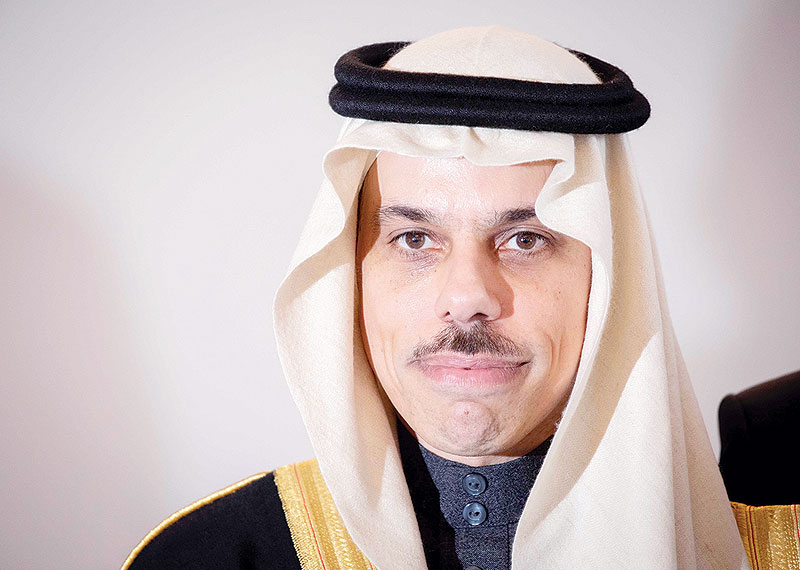Riyadh seeks to boost its global image, contain arch-rival Iran

RIYADH: Saudi Arabia appointed a prince with diplomatic experience in Western capitals as foreign minister on Wednesday in a partial cabinet reshuffle as the kingdom tries to mend its international image and prepares to take over the Group of 20 presidency. Prince Faisal Bin Farhan Al Saud had served for the last several months as ambassador to Germany and earlier as political adviser at the Washington embassy.
His previous business career in the defense industry included chairmanship of a joint venture with planemaker Boeing. Saudi Arabia, a key US ally in confronting Iran, has faced intense Western criticism over its human rights record, including over last year's murder of journalist Jamal Khashoggi and its involvement in the devastating war in Yemen.
Prince Faisal joins a new cadre of top Saudi diplomats in their 40s, including the ambassadors to the United States and Britain, who are siblings. "Look at the team being put together in DC, London, and now with the new foreign minister… Consolidation deepens and a pro-Western crew is in place," said Neil Quilliam, senior research fellow at Britain's Chatham House think-tank. "It is a move to outsmart Iran in all the capitals and at the UN. This is a new form of pushback."
Saudi Arabia is trying to build consensus to contain the missile program of its regional foe after the Trump administration withdrew from a deal that put limits on Tehran's nuclear program in exchange for easing sanctions. Washington and Riyadh blame Iran for a series of recent attacks, including a Sept 14 strike on key Saudi oil sites. Iran denies responsibility. Saudi Arabia's young diplomats are part of a new generation of royals, including several other ministers and deputy governors, who have risen to power under Crown Prince Mohammed bin Salman, 34.
The de facto ruler of the world's top oil exporter has the support of many Saudi youth as he pushes to diversify the economy and open the ultra-conservative society up to the world. But his reforms have been accompanied by a crackdown on dissent including the arrest of scores of critics. As part of Wednesday's reshuffle announced in state media, Saleh Al-Jasser, director general of Saudi Arabian Airlines, replaced Nabil Al-Amoudi as transport minister.
It was unclear if Amoudi would remain in government. He was appointed last month to the board of Saudi Aramco as part of top management changes in the kingdom's energy sector as the state oil giant prepares for a partial share flotation as early as this year. Outgoing foreign minister Ibrahim al-Assaf, who had earlier served as finance minister for years, remains a minister of state. He was appointed less than a year ago to restructure the ministry.
New bankruptcy law
The merit of Saudi Arabia's new bankruptcy law, part of efforts to help the kingdom attract investors, should become clearer in about a year after courts handle initial cases, a World Bank representative and senior government official said. A lack of modern bankruptcy regulations had created difficulties for struggling companies seeking to restructure debt with creditors since the 2009 global financial crisis and the more recent dip in oil prices.
Legislation introduced in 2018 is part of broader efforts to overhaul the economy of the world's top oil exporter to entice foreign investment, create jobs for young Saudis and diversify into non-oil industries. "They have started on insolvency," said Simeon Djankov, World Bank senior research director and founder of the Doing Business report, which ranked Saudi Arabia's business climate the most improved over the previous year. "The law has been passed, secondary legislation was already passed. Now we need to see whether the courts actually understand how to implement it."
Djankov said only three cases had been settled and around a dozen others are currently in the courts. Several dozen more, expected to be resolved over the next year, should provide enough evidence to evaluate the law's success, he added. The two main open cases involve conglomerates Saad Group, owned by indebted billionaire Maan al-Sanea, and Ahmad Hamad Algosaibi and Brothers (AHAB), which defaulted on about $22 billion in combined debt in 2009.
Resolving insolvency was an area of improvement for Saudi Arabia, climbing 30 places to 62nd in the World Bank report which showed sharp improvement in other Gulf countries and a lag in Latin America. Eiman Al-Mutairi, who heads Saudi Arabia's National Competitiveness Center, said she expects further advances next year as the bankruptcy law and other reforms come fully on line, including a building code law and planned amendments to licensing regimes.
"Are we there yet? No. Do we want to do more? Absolutely," said Mutairi, who is one of the highest-ranking women in the Saudi government. "Hopefully this is only the beginning." She attributed the jump in Saudi Arabia's standing to authorities' efforts to cater their reforms to the private sector's concerns. "Maybe we've worked with investors many years ago but sometimes we just don't listen to them," she said. "Let's face it: we did not listen to the investor."- Agencies




